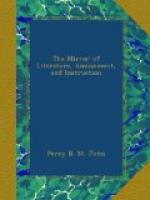The legal talents and acquirements of Lord Thurlow have been the subject of frequent panegyric; but it may, perhaps, be questioned, whether in all cases those eulogiums were just. It has been said—but with what truth it is difficult to form an opinion—that his lordship was much indebted to Mr. Hargrave, for the learning by which his judgments were sometimes distinguished, and that Mr. Hargrave received a handsome remuneration for these services. “As lord chancellor,” says a writer who was personally acquainted with his lordship, “from a well-placed confidence in Mr. Hargrave, who was indefatigable in his service, he had occasion to give himself less trouble than any other man in that high station. An old free-speaking companion of his, well known at Lincoln’s Inn, would sometimes say to me, ’I met the great law lion this morning going to Westminster; but he was so busily reading in the coach what his provider had supplied him with, that he took no notice of me.’”
The ardent zeal with which Lord Thurlow contested the great question of the regency, led him, if we may credit the narrative of one who was a party to the debate, to be guilty of an act of great disingenuousness. Dr. Watson, the Bishop of Llandaff, in the course of a speech, in which he supported the claims of the Prince of Wales, incidentally cited a passage from Grotius, with regard to the definition of the word right. “The chancellor, in his reply,” says the bishop in his memoirs, “boldly asserted that he perfectly well remembered the passage I had quoted from Grotius, and that it solely respected natural, but was inapplicable to civil, rights. Lord Loughborough, the first time I saw him after the debate, assured me that before he went to sleep that night he had looked into Grotius, and was astonished to find that the chancellor, in contradicting me, had presumed on the ignorance of the house, and that my quotation was perfectly correct. What miserable shifts do great men submit to, in supporting their parties! The Chancellor Thurlow,” continues the bishop, “was an able and upright judge, but as the speaker of the house of lords, he was domineering and insincere. It was said of him, that in the cabinet he opposed everything, proposed nothing, and was ready to support anything. I remember Lord Camden’s saying to me one night, when the chancellor was speaking contrary, as he thought, to his own conviction, ’There now! I could not do that: he is supporting what he does not believe a word of.’”
Roscoe’s Lives of Eminent Lawyers—Cabinet Cyclopaedia.
* * * * *
MANNERS AND CUSTOMS.
* * * * *
TORCHLIGHT.




